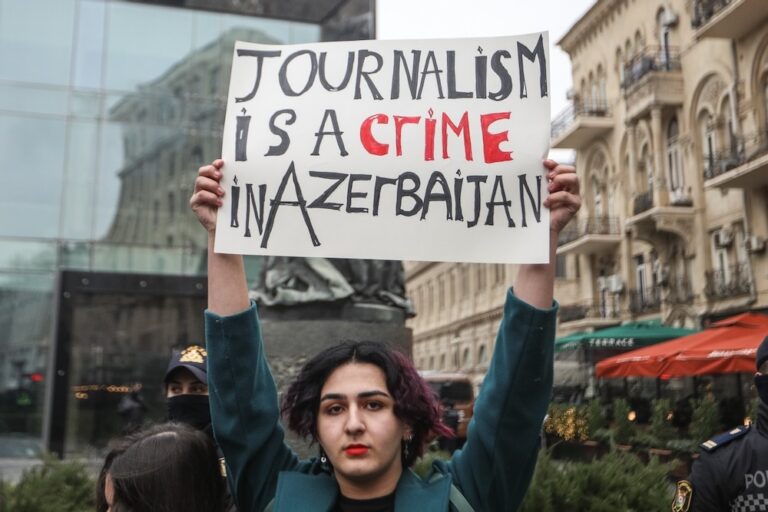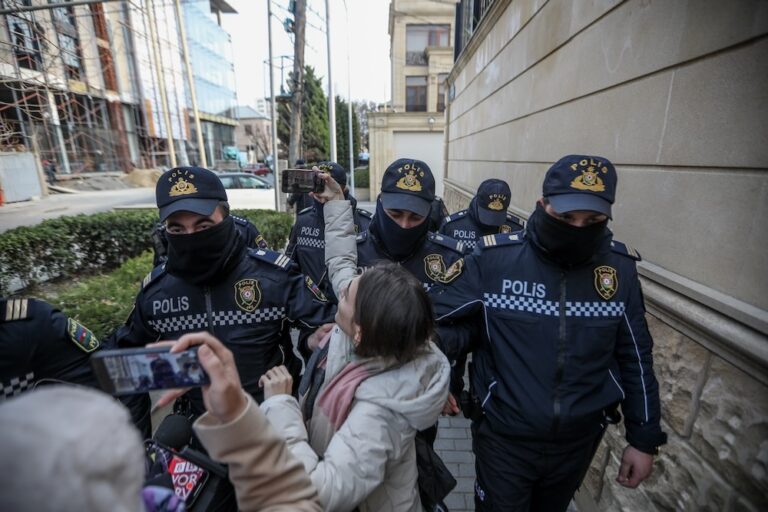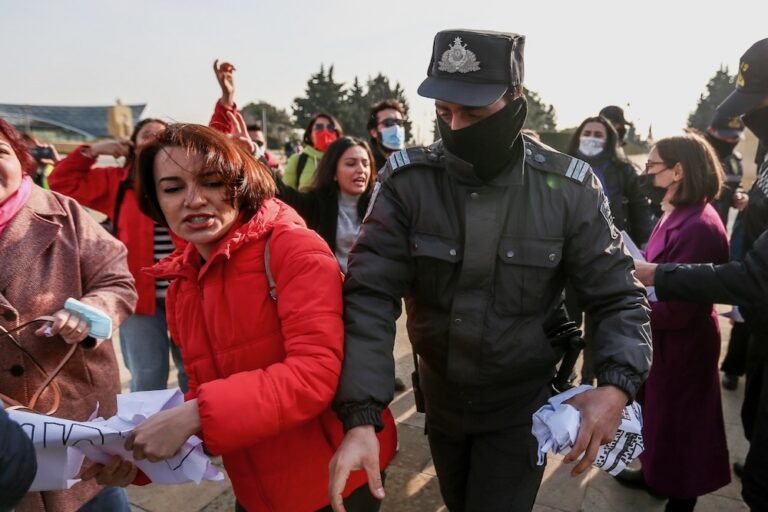Uzeyir Mammadli, Rashadat Akhundov and Zaur Gurbanly have been sent to pretrial custody on dubious charges of illegal weapons possession. All are board members of NIDA, a youth opposition movement that is highly critical of the government.
An Azerbaijan court sent three political activists to pretrial detention in recent days on dubious charges of illegal weapons possession, Human Rights Watch said today [3 April 2013]. The arrests bring to seven the number of youth activists detained in connection with a peaceful protest on March 10, 2013.
The Nasimi District Court sent Uzeyir Mammadli, 25, and Rashadat Akhundov, 28, to pretrial custody on March 30, and Zaur Gurbanly, 26, on April 1. All are board members of NIDA, Azeri for exclamation mark, a youth opposition movement active on social media that is highly critical of the government.
“The government seems to be trying to silence this youth protest group,” said Rachel Denber, deputy Europe and Central Asia director at Human Rights Watch. “These arrests are clearly intended to intimidate other young activists critical of the government.”
The Azerbaijani authorities have a record of pressing bogus charges, including for drug possession, to intimidate and silence investigative journalists.
The authorities should release all seven activists, investigate the circumstances of their arrests, and drop the charges unless they produce credible evidence that they are legitimate and justified, Human Rights Watch said.
Four other board members were arrested and charged earlier in March after police claimed to have found in the members’ homes Molotov cocktails and drugs intended for the group’s use during the protest. The parents of the men insist that the improvised weapons were planted. The detainees were not allowed to see their lawyers for two days.
In the three new cases, the prosecution claimed that the men were part of a group that illegally possessed weapons, but presented no evidence to substantiate the allegation. The lawyers told Human Rights Watch that the court did not seek any evidence.
The failure to take basic steps to establish whether the grounds for detaining the men were reasonable is a violation of the standards required by the European Convention on Human Rights (ECHR), to which Azerbaijan is a party, Human Rights Watch said.
The convention requires courts to give sufficient and concrete reasons for ordering pretrial detention. The European Court of Human Rights has said that, in line with the “special diligence” required, courts have a duty to establish convincing reasons for ordering detention, and that to rely on the prosecutor’s formalistic submissions to the court is insufficient for this purpose.
Three NIDA board members – Bakhtiyar Guliyev, Shahin Novruzlu, and Mahamad Azizov – were arrested initially on March 7 and charged with planning to incite violence at the March 10 protest.
Nearly all Azerbaijani television channels, including the state channel and the public broadcaster, showed police recordings of Guliyev and Azizov allegedly confessing to planning to use Molotov cocktails during the protests to challenge police and destabilize the situation. The televised statements, which appeared to be coached, raised fears that the activists were coerced or threatened in custody at a time that they were being denied their right to a lawyer.
A fourth NIDA board member, Rashad Hassanov, was detained and sent to pretrial custody for three months, also on weapons charges, on March 14. Hassanov’s lawyer told Human Rights Watch that on March 14 one of the two men whose confessions were televised implicated Hassanov. According to the lawyer, the other retracted his televised confession, saying that it was made under duress.
The Azerbaijani authorities should promptly and effectively investigate the circumstances of the alleged confessions, Human Rights Watch said.
In particular the Azerbaijani authorities should investigate why the men did not have access to their lawyers when initially detained. As the European Court of Human Rights has emphasized on multiple occasions that, “access to a lawyer should be provided as from the first interrogation of a suspect by the police, unless it is demonstrated in the light of the particular circumstances of each case that there are compelling reasons to restrict this right.”
All of the detainees are active Facebook and Twitter users, often posting criticism about alleged government corruption and human rights abuses. Several NIDA activists also administer a Facebook page, “The Heydar Aliyev Page,” named for a former president. The page is a platform for caricature, satire, and criticism of the government.
The Grave Crimes Investigation Department under the prosecutor general’s office detained Akhundov and Mammadli on March 30 and Gurbanly on April 1. People close to the activists told Human Rights Watch the three were taken into custody under similar circumstances on the street by agents in civilian clothes.
They are charged with illegal weapons possession by an organized group under article 228.3 of the criminal code. If convicted, they face up to eight years in prison.
“It defies all due process standards that all of these young activists should be put behind bars based on no more than a televised confession made under very dubious circumstances,” Denber said. “The only thing the apparent confessions should lead to is investigations into threats and unlawful coercion of government critics.”


